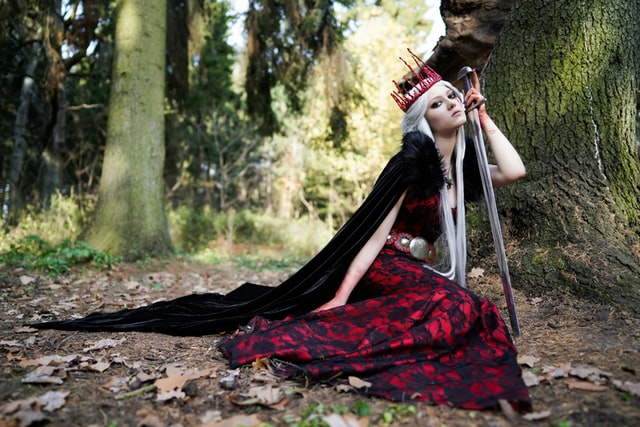Photo by Linus Sandvide on Unsplash
I’ve been meaning to do a comparison of Vampire: the Masquerade and Dungeons and Dragons for anyone who’s torn between these two games. However, I’ve been putting it off for awhile because honestly, these games almost couldn’t be more different from one another.
In fact, it made way more sense for me to compare Vampire: the Masquerade vs Werewolf: the Apocalypse. If you’re not incredibly familiar with either one, or you only know one really well, then this concept might not be apparent to you, though.
That’s why, although these systems are quite different, it’s worth doing a basic comparison. In this Vampire the Masquerade vs Dungeons and Dragons comparison, I’ll highlight some superficial commonalities and differences between these two beloved systems.
Quick Intro to VtM and DnD

In the event you’re new to the world of tabletop RPGs, let’s start with the basics: what are Vampire: the Masquerade and Dungeons and Dragons?
In short, they are both choose your own adventure games. One player functions as a sort of storyteller, and the others are “characters” in the story who choose how to respond to various events.
In Vampire: the Masquerade, you’ll be playing as newly transformed vampires trying to acclimate to the changes they’re going through. Dungeons and Dragons is quite a bit more diverse with what kinds of characters you can play, since it takes place in a fantasy setting.
But I’ll get more into all that later. I’ll be starting by talking about what they have in common first…which honestly isn’t a lot.
Before I dive into the comparison, let me also explain that I’ll be referencing specific editions for either game: 5E for DnD and V5 for VtM.
Similarities
Tabletop RPG Game Type
The first and most obvious similarity between them is that they’re tabletop RPGs. As we mentioned briefly above, a tabletop RPG is basically like a verbal version of a choose your own adventure novel.
One person is selected to tell the story. In DnD, this person is called the dungeon master (or DM), and in VtM, this person is called the Storyteller.
Every other person in the group makes a character through which they will act out in the DM’s or Storyteller’s world. Either game has sets of rules guiding you through how to make a character, imposing limitations on what you’re able to do.
Tabletop RPGs are like the ultimate video game experience. If you’ve ever thought a video game was too restrictive, you’ll love how creative a TTRPG allows you to be.
Special Abilities
For the most part, you don’t play games to play someone completely ordinary (although simulator games like that do exist). Many people use games of all types as a form of escapism, allowing them to become other, unique people.
One especially appealing aspect about tabletop RPGs in general is that you get to do exactly that: play unique people with extraordinary abilities or lives. The abilities kind of differ from game to game, but that’s something I plan to touch on more when we talk about differences.
My point is that either DnD or VtM will have you assume the role of someone who either isn’t human or who’s much more than simply human. Your character will likely possess powers far beyond the grasp of day-to-day life.
Class-Type Categories
If everyone in your group played the exact same kind of character, it would probably get boring pretty fast, wouldn’t it? This is why both DnD and VtM offer different categories while you’re creating your character, with each category offering you unique backgrounds, skills, and abilities.
In DnD, these categories are called classes. They are not called classes in VtM, but VtM does have something similar to classes: vampire clans that each specialize in their own skillsets.
Planning to build your own vampire for Vampire: the Masquerade? You can read our guide to what I feel are the best clans.
Supernatural Elements

Because both games take place in fantastic settings, supernatural components are parts of both. You can find things like spirits, werewolves, demons, and vampires whether you’re playing DnD or VtM.
So if you’re a sucker for the paranormal (like me), you can potentially get your spooky fix from either game. That being said, I do think Vampire: the Masquerade focuses on these elements quite a bit more than Dungeons and Dragons, especially since the main characters are literally vampires.
Differences
Alignment in DnD
Now for the differences between these systems…of which there are many, as you’re about to find out.
One of the first differences I thought of was the alignment system in Dungeons and Dragons. The alignment system essentially has you defining your character on a scale ranging from good to evil. It isn’t all that common that people will play evil characters, though, since these characters obviously don’t mix well in parties with neutral or good characters.
Alignment, at its core, is a definition of how you’re going to play your character. Are you going to be a hero or a villain? Or are you going to be neither – just someone who looks out for their own interests and makes decisions on a case-by-case basis?
Vampire: the Masquerade lacks any such system. Vampires (also called Kindred) are, by their very nature, dark. They do not experience emotions the same way that we as humans do. I wouldn’t go so far as to call them all evil, but they’re willing to be quite a bit more selfish than the average person.
That being said, there is one aspect of VtM that kind of relates to alignment, and that’s your humanity score. Vampires who act more compassionately and consciously are likelier to have a higher humanity score, which means they look more like a normal person and they still retain some semblance of emotion and self-control. Whether you find that rewarding or not is up to you.
Setting
Another drastic difference in this comparison is the setting.
Dungeons and Dragons campaigns can often be “re-skinned” to take place wherever you want them to, using only the base system to run your game, but the default setting is the Forgotten Realms. The Forgotten Realms is a fantasy world with multiple planes of existence that each have their own unique feel. There are hellish planes, heavenly planes, forest planes, icy planes – any kind of fantastic world you can imagine.
This makes DnD extremely versatile. No matter what kind of atmosphere you’re looking to cultivate, there’s likely a region in the base game that fits the bill.
The setting in Vampire: the Masquerade is a little less flexible because it’s basically just our world with a lot of embellishments. It takes place in the World of Darkness, which is just our planet with a secret, seedy, supernatural underbelly.
If you’re into all things gritty, this is a great game and setting for you. But if you’re looking for something a little brighter and more optimistic…not so much.
Theme

There are thematic differences to consider, as well. Given its diverse setting and character creation possibilities, the themes and moods for DnD campaigns can be incredibly diverse.
If you want to play something that will make you feel heroic, then that’s easily possible. You and your group can all play good-aligned characters. On the opposite end of the spectrum, you can also play a group of villains if that’s more your style.
Similarly, there are many subthemes and variations that can be applied to a DnD campaign. You can play a futuristic game, a steampunk one, a cyberpunk one – the sky is the limit.
Dungeons and Dragons also tends to feature a lot of combat. Of course, it doesn’t have to, but it has a combat system that’s smooth, understandable, and a pleasure to use.
On the flipside, the themes in Vampire: the Masquerade tend to revolve around darker concepts. Your characters have just been turned into vampires, and you’re learning what that means. You’ll need to struggle to control your newfound thirst, as well as decide if you want to cling to your humanity or let it go.
This game focuses largely on political intrigue; betrayal, uneasy alliances, and navigating a world of people who are all two-faced are all things you’ll deal with as you play. I recommend it for experienced role players who aren’t afraid to get into character.
Read Next: How to Start a Roleplay Conversation in DnD
Character Races
As I mentioned above, DnD gives you tons of choices when it comes to character creation. There are numerous races you can play with their own unique appearances and bonuses.
Pretty much any race you’d encounter in your standard fantasy novel is a possibility in Dungeons and Dragons. Beyond that, there are tons of others that are pretty creative and unusual. This means that, when all is said and done, you can end up with an extremely diverse party.
Although there are different clans for you to choose when building your vampire in Vampire: the Masquerade, you still all come from the same race: human. In the olden days of the game, there were even more clans than today, with one called the Tzimesce that could change their own physical appearance.
Unfortunately, more recent editions of the game have really pared down the playable clans. An experienced Storyteller would need to bend the rules to make them an option for players.
Popularity
There are some who would debate me on this depending what type of social circle they’re in, but I think Dungeons in Dragons is generally much more well-known. If you don’t believe me, all you need to do is go onto forums where people search for gaming groups, such as Reddit’s r/lfg or Roll20.
I can almost guarantee that 90% of the time or more, those searching for games are looking for DnD 5E players. For decades, Dungeons and Dragons has continued to dominate the tabletop RPG world, and this is abundantly apparent whenever you’re trying to put together a campaign.
That’s not to say it’s completely impossible to find a Vampire: the Masquerade group. In fact, after DnD, it’s probably one of the more well-known tabletop RPGs. It’s just easier to find players for such a group if you have a social circle that’s more into alternative subcultures like goth, for instance.
Beginner-Friendliness
Are you new to the world of tabletop RPGs? Then it’s likely easier for you to pick up DnD 5E because of how user-friendly its system is.
The fifth edition of Dungeons and Dragons is the result of years of experimenting to make the system easier to understand. That’s precisely what makes it an excellent “gateway RPG” for people who are trying to learn to play.
Plus, there are so many resources out there for you when you first get into DnD as opposed to VtM. No matter which aspect you’re confused about, there’s a place that can answer your questions. That’s just part of what happens when something is this popular.
Character Advancement

Most of the time, your characters in DnD and VtM start off as being extraordinary. However, they are still, in many ways, beginners. The story you’re playing in will get progressively harder, so you’ll want your characters to grow to match future challenges.
This is called character advancement. How it happens is quite different in either Dungeons and Dragons or Vampire: the Masquerade.
In DnD, you have a very straightforward leveling up system. The maximum level your character can reach is 20, and they do so by earning specific numbers of experience points. Experience points are gained by completing story arcs and investigations or defeating enemies. You can check out this detailed chart to see a breakdown of how many experience points are necessary to reach each level.
Now, in VtM, you must throw this concept of “leveling up” out the window. Your vampires don’t have specific levels to reach, nor do they have a maximum level cap. Instead, you can increase your skills and stats by spending experience points, which are earned at the end of every session and story arc.
Skills
In either game, skills are specific abilities your character has that can be used in different situations. Generally, your skill has some kind of rating that will help you determine if you succeed or fail in something by rolling a die.
I guess I could say it’s a similarity that both have skills, but I’m going to count it as a difference because those specific skills vary from game to game. In DnD, these are your skills:
- Acrobatics
- Animal Handling
- Arcana
- Athletics
- Deception
- History
- Insight
- Intimidation
- Investigation
- Medicine
- Nature
- Perception
- Performance
- Persuasion
- Religion
- Sleight of Hand
- Stealth
- Survival
In Vampire: the Masquerade, however, you’ve got quite a few more skills to make use of:
- Athletics
- Brawl
- Craft
- Drive
- Firearms
- Melee
- Larceny
- Stealth
- Survival
- Animal Ken
- Etiquette
- Insight
- Intimidation
- Leadership
- Performance
- Persuasion
- Streetwise
- Subterfuge
- Academics
- Awareness
- Finance
- Investigation
- Medicine
- Occult
- Politics
- Science
- Technology
I don’t think this means that VtM is more in-depth, necessarily. It all comes down to the creativity of your DM or Storyteller. If a task doesn’t feel like an exact fit for a skill in DnD, your DM will usually just pick a skill that kind of relates to it.
However, I do think the wide range of skills in VtM is a reflection on the ability you’ll have to fine-tune your character. It also reflects the system very well; as you’ll notice, there isn’t really a focus on combat-oriented skills. This makes sense, given that it’s a game that encourages roleplaying far more than DnD does.
Base Stats
Basic stats are crucial to either game. These numbers represent your character’s physical and mental attributes, setting boundaries for what you’re capable of doing. What either game chooses to delineate in stats, though, is where the difference lies.
Dungeons and Dragons has six basic attributes: strength, dexterity, constitution, intelligence, wisdom, and charisma. Most people will focus more heavily on the first five statistics, while charisma – attractiveness, whether personality-related or appearance-related – is oftentimes called the “dump stat.”
Vampire: the Masquerade is a wee bit more nuanced when it comes to attributes, as there are nine. The attributes include strength, dexterity, stamina, charisma, manipulation, composure, intelligence, wits, and resolve.
This gives you a bit more flexibility to really create a character reflecting the image you have in mind. If you wanted to make a good liar in DnD, for example, you’d just put points into charisma. In VtM, you can put your points into your manipulation stat specifically.
Potential Enemies
While there is some overlap between DnD and VtM, for the most part, you’ll encounter different enemies in them.
Dungeons and Dragons contains just about every fantasy monster you’ve heard of. There are dragons (of course), giants, zombies, goblins, evil wizards, and hundreds of other things you’ve never encountered before. Again, the sky is the limit here.
With Vampire: the Masquerade, your potential foes are a bit more limited. Fairly often, the enemies you confront are just other vampires – and probably vampires you almost trusted before. Of course, there are other things you might encounter, such as werewolves and spirits, but the bulk of the game tends to focus on other bloodsuckers.
Which Should You Play Next?
Now for the most important question: which game would I recommend for you? That depends on a few factors, but I think the biggest one is what kind of atmosphere or theme you’re looking for.
Vampire: the Masquerade is famous for its gritty, goth, alternative 90’s aesthetic. If you’re looking for something with a thoroughly adult and gothic feel to it, it’s the perfect system to indulge in.
I think Dungeons and Dragons is a lot more versatile. It can be essentially anything you want it to be, whether that’s heroic, comedic, steampunky, or futuristic. It works best, though, for high fantasy campaigns that make you feel like you’re in Lord of the Rings.
Beyond atmosphere and theme, there’s general gameplay styles to think about. Dungeons and Dragons has a solid combat system, so it’s excellent for players who want to dive into the fray often.
On the other hand, Vampire: the Masquerade is a game about political intrigue. It’s extremely roleplay-heavy. I’d recommend it for anyone who loves really getting into character and doesn’t feel self-conscious about it.
It’s entirely possible to have combat in VtM. Many players agree, though, that it’s much stronger when it comes to roleplay and investigation.
In short: go with DnD if you want combat or high fantasy, and go with VtM if you want a more comprehensive roleplaying experience with a gritty atmosphere.
Which one do you prefer? Let me know by leaving a comment below.
